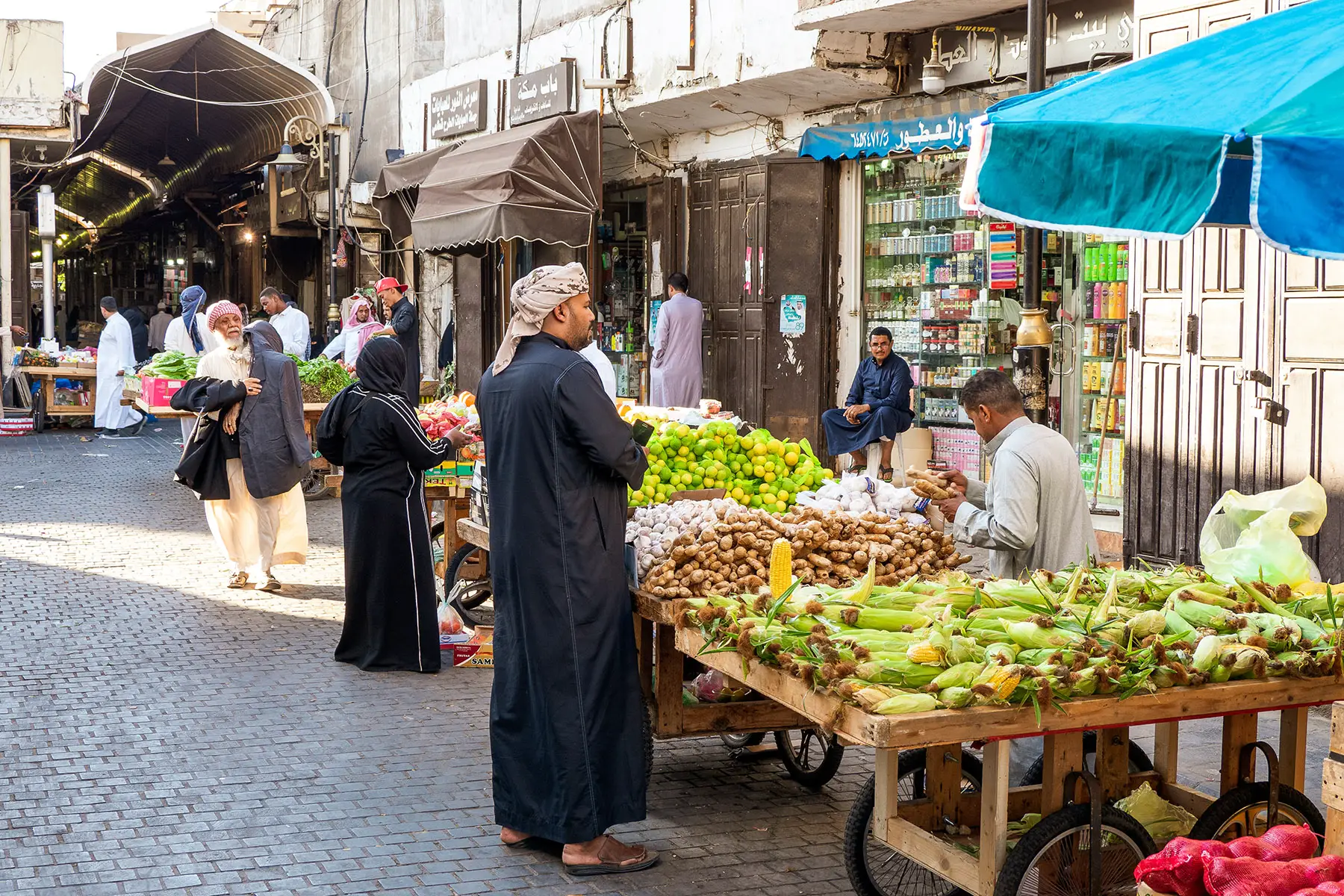Studying in Saudi Arabia might not be the first thing that pops into your head, but it’s definitely worth a closer look. The country is home to modern campuses, world-class universities, and programs taught in English that welcome students from all over the globe.
Whether you’re after a science degree, a scholarship, or just a new adventure, here’s how higher education in Saudi Arabia could be your next big move:
- Higher education in Saudi Arabia
- Degree programs in Saudi Arabia
- Postgraduate programs in Saudi Arabia
- General requirements for studying in Saudi Arabia
- Costs of studying in Saudi Arabia
- Funding available for studying in Saudi Arabia
- Study exchange programs in Saudi Arabia
- Qualifications awarded in Saudi Arabia
- How to apply to study in Saudi Arabia
- Student housing in Saudi Arabia
- Working while studying in Saudi Arabia
- Student healthcare in Saudi Arabia
- Student life in Saudi Arabia
- Cost of living in Saudi Arabia
- After studying in Saudi Arabia
Higher education in Saudi Arabia
Higher education in Saudi Arabia looks much like the education landscape in the United States; with two semesters running from September to June, beginning after graduation from secondary school. Although historically many Saudis have chosen to study outside the country, the government is investing heavily in the education sector and incentivizing people to study in-country in the various public and private universities, colleges, and vocational training centers.

As a result, you will find seven Saudi universities in the top 700 global rankings. For expats looking to study in the Kingdom, it can be tricky to do. However, in many institutions, English is the language of instruction and is used in many private institutions and certain fields such as engineering. That said, the quality of English instruction varies.
Degree programs in Saudi Arabia
Universities in Saudi Arabia
Saudi Arabia has 28 public and 10 private universities, although most of the research funding is centered in public institutions. Some universities are entirely gender-segregated, while some host both genders with gender-segregated classes. Fields of study across the Kingdom include medicine, economics, engineering, teaching, Islamic Law, and veterinary science, among many others. Most programs in universities are 4-year, degree-granting programs.
Private colleges in Saudi Arabia
Offering less competitive admissions and a higher price tag, as well as more technical and vocational options, private colleges abound in the Kingdom. They offer a range of programs, including diploma and certificate programs, as well as medium- and short-term courses of study. Some are gender-segregated and offer Arabic-only instruction, so be sure to do your homework first.
Entry requirements
Gaining admission to higher education is fairly straightforward. You will need to complete the required application and submit your high school diploma and transcripts. If you graduated from a Saudi secondary school, you will need to submit your General Secondary Education Certificate; the exam that students take at the end of secondary school. Keep in mind that more competitive programs have certain score thresholds. If you finished secondary school elsewhere, verify with your chosen university what you need to submit to prove aptitude.
The best universities in Saudi Arabia
Here are some of the top universities in the Kingdom:
- King Abdulaziz University
- King Fahd University of Petroleum and Minerals
- King Saud University
Postgraduate programs in Saudi Arabia
Master’s level
You will find master’s programs in fields of study ranging from marine science to architecture to human resource management. Most programs are two years, although this may vary based on the program and whether you study full-time or part-time. Usually, schools require a bachelor’s degree in a relevant field, a particular GPA, letters of recommendation, and the exam results of a standardized English exam, such as TOEFL. Most will also request your scores from your Graduate Record Examination (GRE). Check with your preferred university for costs, requirements, and offerings.
Doctoral level
Studying a terminal degree in Saudi Arabia has some serious perks. For instance, although it can take between two and a half to five years, most PhDs are fully funded. The Saudi government has been investing heavily in education and is consciously recruiting foreign students. To apply, you will likely need to show proof of a bachelor’s (and sometimes master’s) degree, your GRE scores, TOEFL scores, and letters of recommendation. If you have a number of universities in mind, reach out directly to learn about application requirements, timelines, and potential costs.
General requirements for studying in Saudi Arabia
Visa requirements
If you would like to study in Saudi Arabia, you will need to apply for a Student Visa beforehand and you can find the requirements here. Interestingly, one of the requirements for being granted a study visa is not just admission to a Saudi university; you must also have received either a partial or full scholarship. Universities understand this rule so most offering admission to international students will also provide some level of aid. Keep in mind that a student visa does not entitle you to be able to work in the Kingdom.
Language requirements
Depending on the university and the program you are interested in, the language of instruction may be English or Arabic, so be sure to do your research on your preferred institution. If you would like to brush up on your Arabic before studying, check out one of the following language institutes in the Kingdom:
Getting overseas qualifications recognized
If you are planning to pursue further study in Saudi Arabia, you will likely have to get your prior education certified. This might take the form of getting it notarized in your home country or getting it authenticated by the Saudi Arabia Cultural Mission. Check with your institution to see what they require, as well as what the visa application requires.
Costs of studying in Saudi Arabia
Unfortunately, it’s impossible to speak of general study costs because this depends on the institution and the course and length of study, as well as whether you end up receiving a scholarship or other aid. As an example, King Fahd University of Petroleum and Minerals, a top university, charges SR 550 per credit hour for foreign graduates studying on a part-time basis.
Programs usually require that you take between 32 and 39 credits to qualify for graduation. Most international students receive either partial or full scholarship, however, so you can assume that the cost of studying would be quite low.
Funding available for studying in Saudi Arabia
The good news is that, because Saudi Arabia isn’t an extremely popular study destination, there are plenty of funding options. In fact, the Saudi government is quite generous with scholarships for people, regardless of nationality. They sometimes offer healthcare, accommodation, annual travel tickets, and a living stipend, too. For more information, check out this link. Apply through your chosen university – and good luck!
Study exchange programs in Saudi Arabia
There are a few study exchange programs in the Kingdom, but most are based on full programs of study (master’s, PhDs) that you would complete in Saudi Arabia. King Abdullah University of Science and Technology offers a few study exchange options, including its Visiting Student Research Program; this is a funded multi-month internship. Check with each program about eligibility and application requirements.
Qualifications awarded in Saudi Arabia
Upon graduating from accredited Saudi universities, you will receive the appropriate internationally recognized qualification; be it a Master’s, Bachelor’s, or Ph.D. Check with each university to see what they offer.
How to apply to study in Saudi Arabia
There is no centralized university application system in the Kingdom. Therefore, you simply have to go through each individual institution that you are interested in. The process and timeline vary between institutions. Keep in mind that you will need to apply for admission to a university and then apply for a student visa from the Saudi government.
Student housing in Saudi Arabia
Because universities recognize that housing can be an issue, many universities offer expat students housing; either for a fee or as part of their scholarship package. Keep in mind, however, that this housing might involve sharing rooms or apartments with other international students. For more information about housing options, reach out directly to your preferred universities.
Working while studying in Saudi Arabia
Unfortunately, the visa you receive as a student in Saudi Arabia does not allow you to work. However, this might be a blessing in disguise – maybe your GPA will thank you!
Student healthcare in Saudi Arabia
Expats living in Saudi Arabia, including students, need to have health insurance. Some scholarships and universities assist students with healthcare in Saudi Arabia. However, it is your responsibility to make sure you are covered. If your home country’s health insurance doesn’t cover you in Saudi Arabia, be sure to purchase a policy before arrival.

Student life in Saudi Arabia
Student life in the Kingdom is what you make it. It is important to meet your academic commitments, go to all your lectures, and turn in your homework on time. It is also important to relax! Although the social and religious realities of living in a conservative country never go away, it is possible to find friendship and fun as a student. Whether you find it through some of the social clubs, among neighbors, or within the expat community, it is possible to enjoy your student life in Saudi Arabia. Generally, a good place to start building a community is among international students on your university campus.
Cost of living in Saudi Arabia
Living expenses in Saudi Arabia are lower than many Western countries and you might find yourself living comfortably on a smaller budget; although this will depend on your lifestyle. Single-unit housing can range from SR 1,500 to SR 3,000 depending on location and size, although your best bet is to try to find accommodation through your university. If you can, try to rent or buy a car because, with the low cost of gas, it often ends up being cheaper than taking taxis everywhere. With enough research and foresight, you should be able to get by on any budget you set yourself.
After studying in Saudi Arabia
The good news is that the majority of the workforce in Saudi Arabia is composed of expats. So, after you finish your studies in the Kingdom, you should be able to find work in your chosen field. Fortunately, there are lots of options – and tons of opportunities in the oil and gas sector specifically – so finding a job will be all about putting out applications and leveraging your network.





